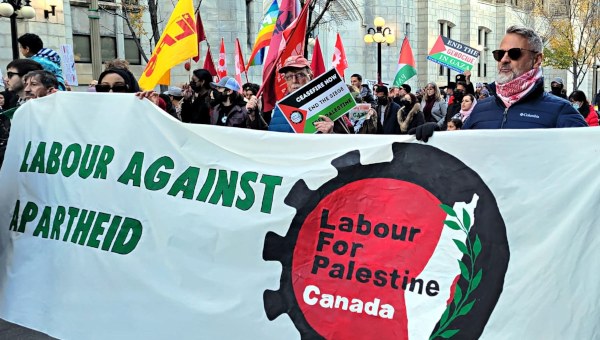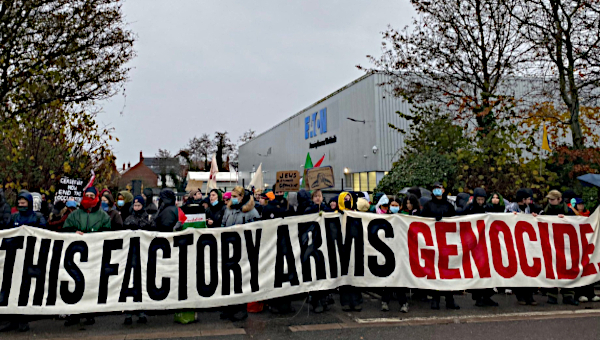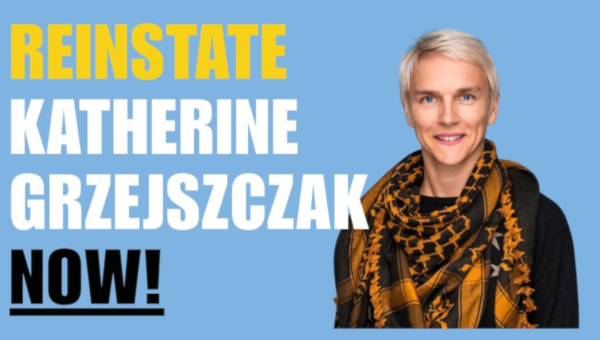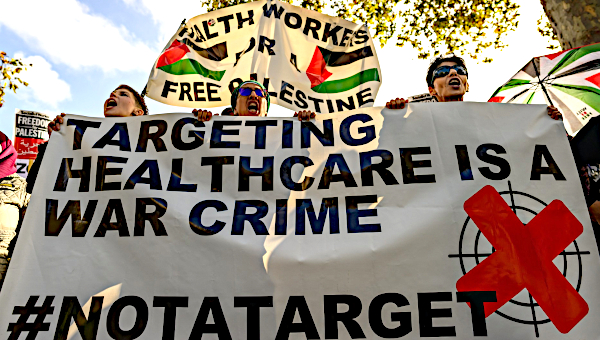The Canadian Labour Movement Responding to Israel’s Attacks on Gaza
Since Israel began its brutal siege of the Gaza Strip on October 7, Canada’s labour unions have largely come out in vocal support of the Palestinians. Ranging from calls for an immediate ceasefire, to opposition to Canadian arms sales to Israel, and statements opposing violence “on both sides,” unions have increasingly lined up to call out Israel’s genocidal attacks on Gaza and the West Bank (see Adam D.K. King’s recent survey of statements and commitments from Canadian labour in The Maple).
Even more, there are inspiring examples of activism among union staff as well as sympathetic rank-and-file members organizing and educating co-workers and colleagues. They are working to transform union cultures to engage in forms of international working-class solidarity and anti-imperialist politics. There has also been for the past decade an ongoing, if uneven, movement of activists working across unions to challenge the Israeli occupation while also supporting trade unionists and other civil society organizations within Palestine. The current activism is partly built on this foundation.
Labour’s response is unfolding in the face of numerous contradictions and challenges: the political inertia that keeps unions from taking an independent working-class position on international issues in ways that challenge the perspective of the ruling classes, the mainstream political parties, and the media; dependence on the NDP, Liberals, and the state and an inability or unwillingness to challenge or break with their corporatist or pro-capital stances; and the absence of an anti-imperialist or socialist political party and movement to influence the union institutions inside, and pressure them from the outside.

Unions and International Solidarity
Support for the Palestinian struggle against the occupation and Israel’s ongoing violence is based on several principles. First, the common class interest in supporting workers fighting imperialism, colonialism, and oppression. Second, recognition of Canada’s origins as a settler colonial state and the similarity with modern Israel. Third, support for working people seeking to live their lives free from oppression, exploitation, and foreign domination. Fourth, the need to challenge employers, the ruling class and states that are engaged in domination around the world.
Underlying these principles is the adage, “an injury to one is an injury to all.” This compels unions to act in solidarity with other working-class people and institutions in their fight against varying manifestations of the same enemy. Of course, this is sometimes easier said than done.
What is required, concretely, are the following:
- Opposing the genocidal attacks on Gaza, and unambiguously calling for an immediate Israeli ceasefire,
- Opposing Israel’s illegal occupation of Palestinian territories and recognizing the reality of apartheid as the underlying injustice that drives the ongoing violence,
- Opposing the Canadian government’s delivery of military aid to Israel (which totalled $26,092,288 in 2022) and its tacit support for Israel’s current attacks on both Gaza and the West Bank,
- Developing educational programs in the unions to build support and understanding of this critical moment as well as awareness of the indispensable role of unions in international struggles,
- Boycotting Canadian companies involved in materially supporting Israel’s brutal and illegal siege, especially if they have contracts with unions.
Some Unions Playing a Leading Role
A number of unions and organizations led by trade union activists have made important steps in this direction.
At its national convention last month, the Canadian Union of Public Employees (CUPE) passed an emergency resolution, which was endorsed by seven local unions, that called on Ottawa to demand an immediate ceasefire in Gaza, ban arms sales to Israel, and work to end Israel’s virtual ‘diplomatic immunity’ at fora like the United Nations. It also called for an end to Israel’s blockade of Gaza and the restoration of aid and the basic necessities of life.
The resolution was passed by over two-thirds of the delegates and can be paired with a resolution from the CUPE staff union, which also called for the investigation of investments by Canadian pension funds in Israeli companies. CUPE also retains an earlier resolution supporting the Boycott, Divestment and Sanctions (BDS) movement.
Elsewhere, the National Capital Region branch of the Public Service Alliance of Canada (PSAC) organized a webinar last week with Labour for Palestine and Independent Jewish Voices. The invitation notes, “Global events have made it clear that it is more important now than ever for an international workers movement to support the ongoing struggle for the liberation of people in Palestine and for an equal society for all people in Israel and Palestine.”
According to PSAC’s October 14 statement:
“The Canadian government must call for an immediate ceasefire to prevent any further loss of life. It must also oppose Israel’s illegal restriction of water, electricity, food and medicine to the more than two million people of Gaza and demand a humanitarian corridor be established immediately… Canada must lend its support in finding a peaceful resolution to the decades-long conflict, which includes calling for the end of the occupation of Palestinian territories.”
The Hamilton and District Labour Council (HDLC) endorsed one of the strongest resolutions calling for an immediate ceasefire and an end to the occupation:
“The HDLC calls for an immediate ceasefire in the Middle East and we re-affirm our position for an end to the occupation of Palestinian territories.
“Further, we call on the Canadian government to stop arming the Israeli government and instead supply humanitarian aid to the Palestinian people to help offset the crisis that continues in Gaza.
“We condemn federal, provincial and municipal politicians who are using the crisis in the Middle East to smear and slander those who speak out in defense of Palestinian human rights as being ‘pro-terrorist’ in a way that undermines freedom of expression and democratic rights.
“We stand in solidarity with those union leaders, labour bodies, and union activists, who take a public position in defense of Palestinian human rights (in particular, Comrade Fred Hahn and the Executive of CUPE 3906) and denounce the attacks they are facing.
“We encourage other labour councils, unions, and labour bodies (both provincially and nationally) to adopt similar positions.”
Canada’s largest private sector union, Unifor, also released a statement on October 17 that calls for an immediate ceasefire in Gaza and an end to the occupation over the longer-term. Unifor has gone to great lengths to develop informational materials on the Israel-Palestine issue, and efforts have been made to strengthen the union’s educational infrastructure on this topic generally. Unifor also has a BDS resolution on its books from 2017.
Much of the strongest union work on the issue comes from networks of members and activists (and union staffers) who have been involved in challenging the dominant pro-Israel narratives about the conflict and have worked to do education about Palestine. In British Columbia, a group of teacher activists calling themselves “Teachers for Palestine” issued an organizing statement to build their network around not just educating coworkers but also bringing the issue into the classroom curriculum.
Their statement begins with the following:
“Teachers for Palestine is a grassroots group of teachers, retired teachers and advocates for education across Canada. We come together with a common purpose of bringing Palestine into our curricular practice. As a settler-colonial nation it is important that we understand and teach the impact of such a difficult history on those colonized. The situation in Palestine today is a direct result of the settler-colonial practices of Israel and its allies – Canada being one of them. If we are to live into real reconciliation it is imperative that educators grapple with this truth. It is our hope that our colleagues will join us in this call for justice at this particular moment.”
In other unions that have issued weaker statements, similar networks are emerging. In Ontario, pro-Palestinian activists who are members of the Ontario Secondary School Teachers Federation (OSSTF) and the Elementary Teachers Federation of Ontario (ETFO) have been working to engage other educators to start conversations to respectfully build support for the Palestinian cause.
Cross-union activists have also challenged Israeli apartheid and the occupation and are building support among unionists to transform the wider position of the labour movement during this crisis. Labour 4 Palestine has a long history of doing this work, and its presence has ebbed and flowed over the years as generations of activists come and go. A new cadre of union activists are breathing fresh life into that organization, and it has already begun to root itself in unions and build public education and action. One of its recent activities in Ottawa involved sit-ins at the offices of 17 MPs, some of whom are NDP representatives. One of the activists told me, “The NDP were ‘appalled’ that we would challenge them.” It shows how disconnected that party is from the movement on the ground.
Another organization, Labour Against the Arms Trade (LAAT), which has a long history of opposing arms sales by Canada to Saudi Arabia, is now turning its sights on Israel. In the first week of November, the group organized an occupation and rally at INKAS, an Israeli-owned armoured vehicle manufacturing plant in Toronto. LATT, too, is planning other actions in addition to organizing and educational work.
Problems and Limitations
I have highlighted some of most inspiring union positions and activities. There are more, and they are thankfully growing. Yet, overall, Canadian labour has played a limited role in the movement to stop Israeli aggression and the occupation. The top-level union institutions such as the Canadian Labour Congress (CLC) and others have been reticent to take a strong stand. This reflects the reluctance of Canadian unions to get involved in international issues in recent years.
Like many union movements around the world, Canadian unions are structured in ways that tie them to individual employers or sectors and create a dependence on the latter for jobs. It tends to direct the perspective of unions and members toward those of employers, especially when there are no political movements or parties embedded in unions to challenge this dependence.
As well, the union movement and the working class has suffered major defeats in the neoliberal era. Employers and the state have successfully demobilized what was once a more activist and militant union movement in the waning days of the Keynesian post-war era. This is changing, as unions are at least mobilizing to make up for concessions and defeats. But this doesn’t address the political defeat of unions and the broader working class. As militant as some unions have been, and seem to be becoming today, they remain tied to the competitiveness of their employers (materially and ideologically) and to a vision of a better, fairer capitalism, rather than socialism. What’s more, they support political parties that reflect that perspective, namely the NDP and in some cases, the Liberals.
A key component of the historic defeat of the labour movement has been the elimination of socialist parties and movements, which in earlier times had some resonance inside and around the union and working-class milieu. But that has virtually disappeared today.
The reluctance of unions to engage in international issues has had a lasting, problematic effect. The CLC historically was a protagonist in the Cold War persecutions of socialists and communists and tied its international work to the interests of Ottawa and Washington. That has changed, but there remains a certain reticence by a number of affiliate unions and key leaders to challenge the foreign policy of the Canadian state, and certainly allyship with NATO, much of it based on the economic integration that came with the neoliberal globalization project.
After what had been a high point of union education and mobilization against globalization (when unions sent buses of members to the massive anti-globalization demonstrations in Québec City in 1999), unions have tended to ignore the need to do education on international issues, much less become leaders in challenging the Canadian state and the capitalist class (including the US empire in which it is enmeshed).
More recently, this has become all the more apparent with the growing ‘new Cold War’ sentiment toward China and Russia and the silence of the union movement. The response of trade unions to the Ukraine-Russia war further reflected this. There were no movements within the unions that directly challenged support for NATO, only uncritical support for arming Kyiv and non-stop demonization of Russia. Although this was and remains a complicated issue, and the left itself is divided on it, there was no controversy within the labour movement. That only served to reinforce the tendency to echo the ruling class and also to cede the foreign policy terrain to the state.
Another factor holding the union movement back has been its ties to and political dependence on the NDP. After all, the NDP has long been an electoralist party championing moderate reforms. It has eschewed working-class identification on the domestic front (rather than celebrating labour as an instrument of major social change) and given up its earlier commitments to challenging free trade, capital mobility, and Canada’s growing militarism on the global stage.
In short, the NDP is not concerned with transforming society or even building toward such transformation. Although it now supports a ceasefire in Gaza, the party has waffled on the underlying issues of the present conflict and has placed potential electoral outcomes above principles. The disciplining of Ontario NDP MPP Sarah Jama and the cozying up of federal leader Jagmeet Singh to the Liberals and domestic pro-Israel lobby groups reflects this.
Of course, the near-constant refrains from the mainstream media, the political establishment, and the pro-Israel organizations that erroneously identify criticisms of Zionism with antisemitism also help to reinforce the reluctance of some unions, and even honest rank-and-file members, to identify and challenge Israel’s flagrant crimes against the Palestinian people.
Conclusion
There has been a growing opposition to Israeli aggression in Gaza and the occupation as a whole, driven by the mass destruction and death being inflicted by the Israeli state. More and more unions have engaged in challenging it. Yet there are roadblocks to having unions play a leading role in educating, mobilizing, and organizing their membership to take to the streets in large numbers and join the growing movement of people on the ground.
We look forward to the buses of young union members bolstering the numbers of protesters to take their place in the movement, matching the numbers at the anti-globalization rallies, or even better, the 100,000 union and community protesters and strikers at the height of the Days of Action in 1995.
The roadblocks are rooted in many different factors, and require a growing movement of activists – and particularly socialists – to work in their unions and in working-class communities and workplaces. •
This article first published on the Canadian Dimension website.





